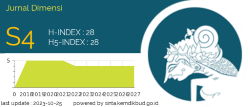Emotional Resilience and Mindfulness in Educators: Insights into Stress, Well-Being, and Perceived Training Needs
Abstract
Keywords
Full Text:
PDFReferences
Aisah, I., Nurhayati, S., & Rukanda, N. (2024). ECCE Principals’ Strategy to Improve Teacher Competence in Implementing the Independent Curriculum. JURNAL INDRIA (Jurnal Ilmiah Pendidikan Prasekolah Dan Sekolah Awal), 9(1), 18–31.
Barrientos-Moncada, M. I. (2023). EFL Teacher Professional Development Needs: Voices From the Periphery. How, 30(2), 92–109. https://doi.org/10.19183/how.30.2.761
Bodenheimer, G., & Shuster, S. M. (2020). Emotional labour, teaching and burnout: Investigating complex relationships. Educational Research, 62(1), 63–76. https://doi.org/10.1080/00131881.2019.1705868
Carroll, A., York, A., Fynes-Clinton, S., Sanders-O’Connor, E., Flynn, L., Bower, J. M., Forrest, K., & Ziaei, M. (2021). The Downstream Effects of Teacher Well-Being Programs: Improvements in Teachers’ Stress, Cognition and Well-Being Benefit Their Students. Frontiers in Psychology, 12. https://doi.org/10.3389/fpsyg.2021.689628
Dolev, N., & Leshem, S. (2017). Developing emotional intelligence competence among teachers. Teacher Development, 21(1), 21–39. https://doi.org/10.1080/13664530.2016.1207093
Emeljanovas, A., Sabaliauskas, S., Mežienė, B., & Istomina, N. (2023). The relationships between teachers’ emotional health and stress coping. Frontiers in Psychology, 14. https://doi.org/10.3389/fpsyg.2023.1276431
Frenzel, A. C., Daniels, L., & Burić, I. (2021). Teacher emotions in the classroom and their implications for students. Educational Psychologist, 56(4), 250–264. https://doi.org/10.1080/00461520.2021.1985501
Green, A. A., & Kinchen, E. V. (2021). The Effects of Mindfulness Meditation on Stress and Burnout in Nurses. Journal of Holistic Nursing, 39(4), 356–368. https://doi.org/10.1177/08980101211015818
Herman, K. C., Reinke, W. M., & Eddy, C. L. (2020). Advances in understanding and intervening in teacher stress and coping: The Coping-Competence-Context Theory. Journal of School Psychology, 78, 69–74. https://doi.org/10.1016/j.jsp.2020.01.001
Iriarte Redín, C., & Erro-Garcés, A. (2020). Stress in teaching professionals across Europe. International Journal of Educational Research, 103, 101623. https://doi.org/10.1016/j.ijer.2020.101623
Iswahyudi, M. S., Wulandari, R., Samsuddin, H., Sukowati, I., Nurhayati, S., Makrus, M., Amalia, M. M., Faizah, H., Febianingsih, N. P. E., & others. (2023). Buku Ajar Metodologi Penelitian. PT. Sonpedia Publishing Indonesia. https://buku.sonpedia.com/2023/09/buku-ajar-metodologi-penelitian.html
Jennings, P. A., Brown, J. L., Frank, J. L., Doyle, S., Oh, Y., Davis, R., Rasheed, D., DeWeese, A., DeMauro, A. A., Cham, H., & Greenberg, M. T. (2017). Impacts of the CARE for Teachers program on teachers’ social and emotional competence and classroom interactions. Journal of Educational Psychology, 109(7), 1010–1028. https://doi.org/10.1037/edu0000187
Juliawati, D., Yandri, H., Rasmita, R., & Daflaini, D. (2024). Transformasi Guru Taman Kanak-Kanak: Membangun Kelas yang Damai dan Bahagia dengan Praktik Mindfulness. Takris: Journal of Community Service, 2(2), 40–47.
Kaihoi, C. A., Bottiani, J. H., & Bradshaw, C. P. (2022). Teachers Supporting Teachers: A Social Network Perspective on Collegial Stress Support and Emotional Wellbeing Among Elementary and Middle School Educators. School Mental Health, 14(4), 1070–1085. https://doi.org/10.1007/s12310-022-09529-y
Khoury, B., Manova, V., Adel, L., Dumas, G., Lifshitz, M., Vergara, R. C., Sekhon, H., & Rej, S. (2023). Tri-process model of interpersonal mindfulness: theoretical framework and study protocol. Frontiers in Psychology, 14. https://doi.org/10.3389/fpsyg.2023.1130959
Kristiyanti, L., & Nurhayati, S. (2024). CRAFTING EFFECTIVE PAUD TEACHING MODULES: A TRAINING NEEDS ASSESSMENT FOR POSYANDU CADRES IN BANDUNG. Jurnal Visi Ilmu Pendidikan, 16(2), 255. https://doi.org/10.26418/jvip.v16i2.74644
Ksiksou, J., Maskour, L., El Batri, B., & Alaoui, M. S. (2022). THE EFFECT OF A MINDFULNESS TRAINING PROGRAM ON PERCEIVED STRESS AND EMOTIONAL INTELLIGENCE AMONG NURSING STUDENTS IN MOROCCO: AN EXPERIMENTAL PILOT STUDY. Acta Neuropsychologica, 20(4), 371–383. https://doi.org/10.5604/01.3001.0016.0894
Kurniawati, A., Nurhayati, S., & Rukanda, N. (2024). Enhancing Early Childhood Education Teachers’ Creativity through Professional Development Training Program. Aulad: Journal on Early Childhood, 7(1), 141–149. https://doi.org/10.31004/aulad.v7i1.537
Kusmiran, Y., Agustin, M., & Dahlan, T. H. (2024). Peran Mindfulness Teaching dalam Mengurangi Stres dan Meningkatkan Kualitas Pengajaran Guru PAUD. Aulad: Journal on Early Childhood, 7(3), 709–722.
Marsegi, S. M., Nurhayati, S., Ansori, A., & Hendriana, H. (2023). Digital-Based Portfolio Assessment Competence of Early Childhood Educators. Jurnal Obsesi : Jurnal Pendidikan Anak Usia Dini, 7(1), 251–259. https://doi.org/10.31004/obsesi.v7i1.3360
Moksin, S. A. H., Mat, M. Z. A., & Bakar, H. N. H. A. (2024). Fiqh Teaching Action Among Islamic Educators in Brunei Darussalam. TATHO: International Journal of Islamic Thought and Sciences, 1(3), 167–183. https://doi.org/10.70512/tatho.v1i3.9
Molina-Moreno, P., Molero-Jurado, M. del M., Pérez-Fuentes, M. del C., & Gázquez-Linares, J. J. (2024). Analysis of personal competences in teachers: a systematic review. Frontiers in Education, 9. https://doi.org/10.3389/feduc.2024.1433908
Musa, S., & Nurhayati, S. (2024). Educators’ Resilience Amidst Digital Era Challenges: Case Study in Indonesia. Journal of Electrical Systems, 20(4s), 832–840. https://doi.org/10.52783/jes.2121
Musa, S., Nurhayati, S., Jabar, R., Sulaimawan, D., & Fauziddin, M. (2022). Upaya dan Tantangan Kepala Sekolah PAUD dalam Mengembangkan Lembaga dan Memotivasi Guru untuk Mengikuti Program Sekolah Penggerak. Jurnal Obsesi : Jurnal Pendidikan Anak Usia Dini, 6(5), 4239–4254. https://doi.org/10.31004/obsesi.v6i5.2624
Nurhayati, S., Kurnianta, P. D. M., & Anggraeni, A. F. (2024). Pengantar Karya Tulis Ilmiah. PT. Sonpedia Publishing Indonesia.
Nurhayati, S., & Novianti, D. (2024). Enhancing Digital Competence: A Comprehensive Digital Educational Games Training Needs Analysis for PAUD Teachers. Jurnal Smart Paud, 7(2), 169–181.
Pahwa, S., & Khan, N. (2022). Factors Affecting Emotional Resilience in Adults. Management and Labour Studies, 47(2), 216–232. https://doi.org/10.1177/0258042X211072935
Rizqi, M. A. (2017). STRESS AND RESILIENCE AMONG EFL TEACHERS: AN INTERVIEW STUDY OF AN INDONESIAN JUNIOR HIGH SCHOOL TEACHER. TEFLIN Journal - A Publication on the Teaching and Learning of English, 28(1), 22. https://doi.org/10.15639/teflinjournal.v28i1/22-37
Schutte, N. S., & Bhullar, N. (2017). Approaching Environmental Sustainability: Perceptions of Self-Efficacy and Changeability. The Journal of Psychology, 151(3), 321–333. https://doi.org/10.1080/00223980.2017.1289144
Shaukat, S., Vishnumolakala, V. R., & Bustami, G. A. (2018). The Impact of Teachers’ Characteristics on Their Self‐efficacy and Job Satisfaction: A Perspective From Teachers Engaging Students With Disabilities. Journal of Research in Special Educational Needs, 19(1), 68–76. https://doi.org/10.1111/1471-3802.12425
Silvania, E., Mulyana, E., & Nurhayati, S. (2024). IMPROVING EARLY CHILDHOOD TEACHERS SKILLS IN CREATING ANIMATED ENGLISH LEARNING MEDIA THROUGH POWERPOINT-BASED ANIMATED MEDIA TRAINING. Empowerment: Jurnal Ilmiah Program Studi Pendidikan Luar Sekolah, 13(1), 33–45.
Somantri, A., Nurhayati, S., Ansori, A., & Boriboon, G. (2024). Improving Open High School Teachers’ Learning Activity Places Management Skills through LAP Managerial Training. JPPM (Jurnal Pendidikan Dan Pemberdayaan Masyarakat), 11(1), 14–25. https://doi.org/10.21831/jppm.v11i1.64758
Suwartono, T., Nurhayati, S., & Junaid, R. (2024). Assessing the need for technology-enhanced tools to release the sufferings of Cinderella in language teaching (Pronunciation). Edelweiss Applied Science and Technology, 8(6), 9756–9765. https://doi.org/10.55214/25768484.v8i6.4101
Woloshyn, V., Savage, M., Maich, K., & Penney, S. (2023). Stress, Coping, and Well-being in Teachers and School Administrators. Alberta Journal of Educational Research, 69(4), 492–513. https://doi.org/10.55016/ojs/ajer.v69i4.75886
DOI: https://doi.org/10.33373/dms.v14i1.7536
Refbacks
- There are currently no refbacks.

This work is licensed under a Creative Commons Attribution 4.0 International License.











